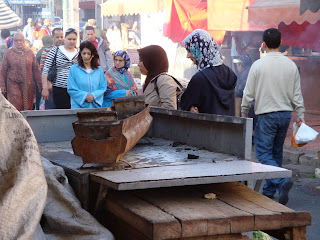 On a given day, I don't tend to draw too much attention in the streets of Rabat. I dress more or less like the Moroccan women my age (long sleeves and sometimes tunics, pants, etc.). There are a lot of Europeans who live in the capital, and they, like me, don't care to be treated like tourists. There's plenty of room for everyone, and in general, everyone's very tolerant of differences.
On a given day, I don't tend to draw too much attention in the streets of Rabat. I dress more or less like the Moroccan women my age (long sleeves and sometimes tunics, pants, etc.). There are a lot of Europeans who live in the capital, and they, like me, don't care to be treated like tourists. There's plenty of room for everyone, and in general, everyone's very tolerant of differences.On the street, folks will automatically speak to me in French. Men greet me with "bonsoir" at just about any hour of the day, and I also often hear "salut" or even "pardon". There's just a lot of French here, even if Morocco isn't fully a Francophone country. And White people are assumed to be French.
Nadia, Eric and I went to the local popular market last weekend to get veggies for Sunday's feast. Nadia did the buying, I watched, and Eric took photos from afar.

Not one person spoke to me in French when I was in my jellabah and headscarf. A few spoke to me in Arabic. And more importantly, no one bat an eye. Of course, I never would have gotten the scarf on properly without Nadia's help. It was her idea that I go incognito in the first place.

It's interesting the reactions that folks have based on preconceived notions about appearance. A woman in a headscarf is modest and laudable in Morocco, whether she has pale skin or dark skin. Frankly, I don't really want to imagine the reaction that I would have received in a mall in the United States in the same attire, as I fear many of my countrymen are a lot less tolerant than the average Moroccan.





1 comment:
A couple of women wearing headscarves walked past my apartment today while I was checking my mailbox. I kept looking at them to make eye-contact to say Hi, but they never looked at me, and I went away wondering if they felt uncomfortable that I seemed to be staring :-/ I see women in headscarves pretty regularly, but then again, I live in a place where it is more common than other parts of the city/state. I find that they stand out, but I find myself more interested than threatened... :)
Post a Comment